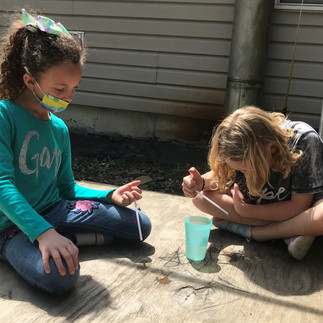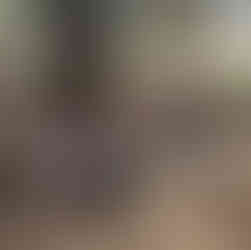What Do We Know
We do not have our students do standardized tests every year. Instead, we rely on a combination of observation, formal and informal assessments, and student work to help us figure out the depth of their understanding. By continually checking for understanding, we modify our lessons and make plans for future activities. We also ask kids to be an active part of this process: setting goals, checking their progress, and deciding if a goal has been met. Before starting our water projects this week, everyone helped me to develop a rubric that would form as their assessment. When they filled it out at the end of the week, most of the students had a clear and accurate idea of how they had done on their projects. Where we disagreed, I asked them to help explain their thinking and let them know what I was basing my judgements on. At the end of process, everyone felt accomplished.
Morgan's PK and K Class
*Worked on the number 22
*Made play dough creations using pipe cleaners and googly eyes
*Looked for bugs and worms outside. Then talked about how they were different.
*Made kindness cards for friends that were absent
*Explored shaving cream and washed dinosaurs with paint brushes
*Watched some of the water cycle presentations that the older kids did!
*Used a lot of stickers to work on fine motor skills
*Explored different textured paper while using watercolors/oil pastels
*Sorted dinosaurs into groups by color and type then counted them
*Used tape measures to find things around school that are 22 inches long
Tracy's 1st and 2nd Grade Class
We took advantage of the spring weather this week to read stories, do some driveway chalk math, and even head into the woods with our writer's notebooks for some nature journaling. We were all looking for small signs of spring using all 5 of our senses.
In math, we are continuing to work on place value and addition. We have been working to put our math strategies into words. A few students were saying, "I just used my head." And while it was true that they were using mental math, we talked about the difference between knowing automatically 2+2=4 without having to pause versus using partial sums addition to figure out that 34+51 is going to be 84 because when you add 30+50 it's 80 and 4+1=5. We also continue to work with arrays, laying the groundwork for multiplication and division.
In writing, I asked the children to help brainstorm ideas for our next writing projects. They came up with a wide variety of different ideas, but ultimately voted on making a new world. They are deciding things like where this planet is, what the geography is like, what sort of life is on the planet, and many other details. Ask your child to talk to you about the world they are creating.
Theresa's 3rd-5th Grade Class
In reading, we are riding the waves of good books! The kids are enjoying their books so much that they are requesting reading groups instead of independent reading! I love all of the books that we are reading, too.
In writing, we started a new "Paragraph a Week" initiative. Each week the kids are going to brainstorm, compose, revise, draft and publish a paragraph. We are going old-school and insisting that everyone write instead of typing. This is going to give the kids lots of practice with the mechanics of standard written English.
Third grade math students have settled into new books and new projects. The 4th and 5th grade math students are making steady progress towards the end of their books.
We have been talking about being happy for our friends, instead of jealous, when they have something that we want. It is so important to cultivate that generosity of spirit, but it can be so hard. Our kids can have such thoughtful and productive conversations about these issues.
Theme: Water Cycle, Erosion, and Deposition
I originally planned to ask everyone to write a story about a drop of water moving its way through the water cycle, but I realized that this was a project that could easily leave room for more choice. We discussed the purpose of the project - to show a thorough understanding of the water cycle, then I told them that they could decide how they wanted to share. They had 4 days to pull the whole thing together. Projects included puppet shows, a salt dough model, books and stories, comic strips, a game show, a spinning water cycle, movies, and a demonstration with real water. As I debriefed with each group afterwards, they felt proud, and I definitely felt confident that they understand the water cycle.
Our New Theme: Indonesia
Every May we dive into learning about a different country. It always involves lots of learning for me too! If anyone has any strong Indonesian resources or connections, please let us know.






































Comments